Sample Speech by School Principal on Graduation Ceremony
Your excellence ____________, Minister of State for Youth Affairs, governing board members, school staff, parents, and honored guests, welcome to our 15th graduation ceremony.
Today marks both an end and a new beginning for our graduates. A time for parents to both honor their child’s accomplishments and a time to worry as they embark on their next journey.
But parents let me put your mind at ease, your child is very well prepared for whatever they choose to peruse after [School Name].
Through the education and the knowledge that they have, and most importantly the guidance, values and the love that you, the parents, have provided to your children, now they are ready to face any challenge.
Today we celebrate dedication and love. Parents, you must be proud of your child and yourselves. On behalf of the school and the students, I want to say: thank you.
Teachers, you have been a key element in the children’s education. Your unconditional support has inspired and encouraged them to achieve their best at [School Name]. Your planning, teaching, and encouraging have come to fruition. How proud you must be today to see your students with bags of good character, lifelong learning skills, and integrity. Your support and dedication cannot be stressed enough. None of this is possible without you. On behalf of the students and the parents, I want to say: thank you.
[School Name] is committed to creating an innovative and a creative education system and to prepare students for a rapidly changing world. We are keen to achieve excellence in education and to ensure relevance, quality, and balance among intellectual, and physical elements in the learning process.
Our mission is to empower and educate students though engaging them in positive student-centered education that balances academic excellence with physical, social and emotional well-being. Massive investments have been planned to create systems based on the requirements of the National Agenda. We are prepared today as we have always been.
Graduates, our warmth congratulations. Just 14 short years ago, you wondered into the kindergarten classroom to start your learning journey. Today, you are about to walk through the school gates as students for one last time.
You took all the knowledge and attention your parents provided and molded it into your own character, making you the fine young ladies and gentlemen that you are today.
Don’t you forget where you came from. Remember the foundation of your family and your society, build upon it and use it to guide you in everything that you do. Stick to the values, morals, and ethics that you were raised into and honor them in every day of your life.
Don’t focus on the negatives and the obstacles that prevent you from reaching your goals. Have a positive outlook at the world. It will make it easier for you to be successful.
I hope that each one of you finds themselves on a stage big enough to have great influence, proclaiming truth and fairness and making a significant difference to the world. From my part, I strongly believe that the future of our society is in very capable hands.
Don’t you ever give up and don’t be afraid of failure. It is ok to fail as long as you learn something from it. The only better thing better than winning, is losing then winning again. Try again, and again, and you shall find success.
Don’t worry if you still don’t know what you want from life. As a matter of fact, some of the most interesting and successful people that I know, still don’t. Life is a journey, and as long as you enjoy it and do what is good for you, your family, and your society, then you are on the right track.
Focus on your goals but don’t live by them. Don’t be afraid of change. Change is a fundamental aspect of our lives. What you want today may be different from what you want ten years from now. That is perfectly normal.
Everything is up for grabs and you can become anything that you desire. You can accomplish anything that you want. Nothing is impossible. We are so proud of what you have evolved to become. You have so much to offer to the world and we are eagerly waiting.
Congratulations to you and to your families. I wish each and every one of you the best of luck, success, and happiness.
Thank you
Traditional Formal Graduation Speech
Subject: Graduation Ceremony Address
Dear Graduating Class of [Year],
Distinguished guests, esteemed faculty members, proud parents, and most importantly, our remarkable graduating students,
It is my profound honor to stand before you today as we celebrate this momentous milestone in your academic journey. Today marks not an ending, but rather a beginning—the commencement of a new chapter filled with endless possibilities.
As I look out at your faces, I see years of dedication, perseverance, and growth. You entered these halls as eager learners, and you leave today as confident individuals ready to make your mark on the world. The knowledge you have gained here extends far beyond textbooks and examinations. You have learned the value of friendship, the importance of resilience, and the power of determination.
Throughout your time at [School Name], you have overcome challenges that tested your resolve. Whether it was late-night study sessions, difficult exams, or personal obstacles, you persevered. These experiences have shaped you into the remarkable individuals you are today.
As you step forward into the future, remember that education is a lifelong journey. The diploma you receive today is not merely a certificate of completion—it is a passport to opportunity. Use it wisely, use it boldly, and use it to create positive change in whatever field you choose to pursue.
To the parents and families here today, your unwavering support has been instrumental in bringing these students to this proud moment. Your sacrifices, encouragement, and love have provided the foundation upon which their success was built.
Class of [Year], as you leave these halls, carry with you the values instilled in you here: integrity, compassion, excellence, and service. The world awaits your contributions, and I have no doubt that you will rise to meet every challenge with grace and determination.
Congratulations, graduates. May your futures be bright, your dreams be realized, and your impact on the world be profound.
With warmest regards and best wishes for your continued success,
[Principal's Name]
Principal, [School Name]
Inspirational and Motivational Graduation Speech
Subject: Your Journey Begins Now
Dear Graduates,
Today, you stand at the threshold of greatness.
Look around you. See the faces of those who laughed with you, struggled alongside you, and celebrated every victory with you. This community you've built is a testament to your character and the bonds that will last a lifetime.
When you walked through our doors for the first time, you were filled with curiosity and perhaps a touch of nervousness. Today, you walk out with confidence, armed with knowledge, skills, and experiences that have transformed you into leaders, innovators, and changemakers.
I won't tell you that the path ahead will be easy—it won't be. You will face obstacles, experience setbacks, and encounter moments of doubt. But here's what I know about each of you: you have already proven that you can overcome adversity. Every challenge you faced here prepared you for what lies ahead.
Remember this: failure is not the opposite of success; it is a stepping stone toward it. Every great achievement began with someone who dared to try, who wasn't afraid to fail, and who learned from every mistake. Be that person.
The world needs what you have to offer. It needs your fresh perspectives, your creativity, your passion, and your commitment to making things better. Don't wait for permission to pursue your dreams. Don't let fear hold you back. Take bold steps, make brave choices, and trust in your abilities.
As you leave today, I challenge you to do three things: First, never stop learning. Second, always remain kind and compassionate. Third, use your talents to serve others and contribute to something greater than yourself.
You are ready. You are capable. You are unstoppable.
Go forth and show the world what the Class of [Year] is made of!
With immense pride and excitement for your future,
[Principal's Name]
Principal, [School Name]
Heartfelt and Personal Graduation Speech
Subject: A Personal Message to Our Graduates
My Dear Students,
Today is bittersweet for me. While I am bursting with pride seeing you reach this incredible milestone, my heart is also heavy knowing that you will soon leave these halls that have been your second home.
I have had the privilege of watching you grow from uncertain newcomers into the confident, capable individuals standing before me today. I've witnessed your triumphs and supported you through your struggles. I've celebrated your victories and helped you rise after defeats. Each of you has left an indelible mark on this school and on my heart.
I remember so many moments with this class—your first day when everything seemed overwhelming, the school events where your creativity shined, the times you came to my office with problems and left with solutions, and countless instances where you demonstrated kindness, courage, and integrity.
What makes me most proud is not just your academic achievements, though those are certainly impressive. What fills my heart with joy is seeing the good human beings you have become. You have shown empathy for classmates going through difficult times. You have stood up for what is right even when it wasn't popular. You have lifted each other up and created a culture of support and encouragement.
As you move forward, please remember that this school will always be your home. The lessons learned here, the friendships forged here, and the memories created here will remain with you forever. And know that I will always be cheering for you, wherever life takes you.
Life will present you with choices—some easy, some difficult. When faced with these decisions, listen to your heart, trust your instincts, and remember the values we worked so hard to instill in you here.
Stay true to yourselves. Be authentic. Be kind. Be brave. And most importantly, be happy.
I am so incredibly proud to have been your principal. Thank you for letting me be part of your journey.
With all my love and best wishes,
[Principal's Name]
Principal, [School Name]
Humorous and Light-Hearted Graduation Speech
Subject: Finally, You're Free!
Dear Graduates (and those who survived raising you),
Well, we made it! I wasn't sure we would, especially after that incident with the science lab and the fire alarm—but here we are!
Looking at you all in your caps and gowns, I'm reminded of your first day here. Some of you couldn't find your classrooms. Others couldn't open their lockers. A few of you are still trying to figure out the lunch schedule. But you know what? You figured out the important stuff—how to think critically, how to solve problems, and most importantly, where the vending machines are located.
They say that school prepares you for life. Well, if that's true, then you've learned some valuable lessons: deadlines are real, coffee is essential, and there's no such thing as a stupid question—though some of you came really close a few times!
In all seriousness (yes, I can be serious), you've accomplished something remarkable. You've completed your education despite countless distractions—social media, video games, and the constant temptation to check your phones during class. Speaking of which, yes, I knew you were doing that. I'm old, not blind.
As you venture into the real world, remember these important life lessons: Google is your friend, but don't believe everything you read on the internet. Sleep is important—you'll miss nap time from kindergarten. And finally, no matter how successful you become, always be nice to people—you never know when you'll need someone to explain technology to you when you're my age.
Go out there and be amazing. Make us proud. And please, visit us sometimes so we can say, "I knew them when they were just troublemakers in my school!"
Congratulations, Class of [Year]! You did it!
With pride and a healthy sense of humor,
[Principal's Name]
Principal, [School Name]
Brief and Concise Graduation Speech
Subject: Short and Sweet Graduation Message
Dear Class of [Year],
Today marks the culmination of years of hard work, dedication, and perseverance. You should be incredibly proud of what you have achieved.
As you move forward, remember three things: believe in yourself, work hard, and treat others with respect and kindness. These simple principles will guide you through any challenge you encounter.
The education you received here has prepared you well for the future. Now it's time to take what you've learned and make your unique contribution to the world.
Congratulations, graduates. We believe in you and can't wait to see what you accomplish.
Best wishes for a bright and successful future,
[Principal's Name]
Principal, [School Name]
Speech Acknowledging Challenges and Adversity
Subject: Triumph Over Adversity
Dear Resilient Graduates,
This graduation ceremony is more than just a celebration of academic achievement—it is a celebration of perseverance, resilience, and the human spirit's ability to overcome adversity.
Your journey has not been easy. You faced challenges that previous classes never had to encounter. Whether it was adapting to remote learning, dealing with personal hardships, or navigating unprecedented global events, you showed remarkable strength and determination.
There were times when it seemed easier to give up, when the obstacles appeared insurmountable, when the finish line seemed impossibly far away. But you didn't quit. You adapted, you innovated, and you supported one another through the difficulties.
What you've accomplished is extraordinary precisely because it was difficult. You've learned lessons that cannot be taught in textbooks—lessons about flexibility, mental toughness, and the importance of community. These lessons will serve you well throughout your life.
As you move forward, remember that challenges are inevitable, but they do not define you. What defines you is how you respond to them. You've already proven that you have what it takes to overcome anything life throws at you.
Your resilience is your superpower. Your ability to adapt is your strength. Your determination is your compass. Trust in these qualities as you navigate the future.
The world needs people like you—people who don't give up when things get hard, people who find solutions instead of making excuses, people who lift others up even while facing their own struggles.
Congratulations on this well-deserved achievement. You have earned this moment, and you should celebrate it fully.
With deep respect and admiration,
[Principal's Name]
Principal, [School Name]
Speech Focused on Future and Career Guidance
Subject: Preparing for Your Future
Dear Future Leaders, Innovators, and Professionals,
As you receive your diplomas today, you're not just ending your time at [School Name]—you're beginning your professional and personal journey into the world beyond these walls.
The question on everyone's mind is: what comes next? Some of you have clear plans—college acceptance letters, job offers, or gap year adventures. Others are still exploring your options, and that's perfectly fine. The path to success is rarely a straight line.
Here's what I want you to know about the future you're entering: it's a world that values creativity, adaptability, and continuous learning. The careers many of you will have don't even exist yet. The technologies you'll use haven't been invented. The problems you'll solve haven't emerged. This might sound daunting, but it's actually exciting—you have the opportunity to shape the future, not just live in it.
As you consider your next steps, remember that success means different things to different people. Don't let others define success for you. Some of you will pursue advanced degrees. Others will start businesses. Some will travel, volunteer, or explore different career paths before finding your calling. All of these choices are valid.
Whatever path you choose, commit to excellence. Be the person who shows up on time, who follows through on commitments, who treats everyone with respect regardless of their position. Develop a strong work ethic, maintain your integrity, and never stop learning.
Build your network starting now. The relationships you maintain with classmates, teachers, and mentors will open doors throughout your career. Stay connected, support one another, and remember that success is often a team effort.
Finally, don't be afraid to take calculated risks. Some of the greatest achievements come from stepping outside your comfort zone and trying something new. If you fail, learn from it and try again. Resilience and adaptability are just as important as knowledge and skill.
The future belongs to you. Go claim it.
With confidence in your abilities,
[Principal's Name]
Principal, [School Name]
Speech with Call to Action and Social Responsibility
Subject: Your Responsibility to Make a Difference
Dear Agents of Change,
Today, as you graduate, you inherit not just opportunities but also responsibilities. You are entering a world that desperately needs your talents, your energy, and your commitment to making things better.
Look at the challenges facing our society—inequality, environmental concerns, social justice issues, technological disruption, and countless others. These are not just problems for someone else to solve. They are your problems now. And you are equipped to address them.
Your education has given you tools: critical thinking, problem-solving skills, creativity, and collaboration abilities. Now I challenge you to use these tools for the greater good. Don't just pursue success for yourself—pursue significance by contributing to something larger than yourself.
This doesn't mean you all need to become activists or nonprofit workers, though some of you might choose those paths. It means that whatever career you pursue, whatever life you build, you should do so with an awareness of your impact on others and on the world.
Be the business leader who prioritizes ethical practices and sustainability. Be the doctor who ensures healthcare access for underserved communities. Be the engineer who designs with environmental impact in mind. Be the teacher who inspires the next generation. Be the artist who challenges perspectives and promotes understanding.
Use your voice to speak up for those who cannot speak for themselves. Use your privilege, whatever form it takes, to lift others up. Use your skills to create solutions to real problems. Use your influence to promote positive change.
The world doesn't need more people who simply take from it. The world needs people who give back, who build up, who make things better. Be those people.
You have the power to shape the future. Use it wisely. Use it compassionately. Use it to create a world we can all be proud of.
Congratulations, graduates. Now go change the world.
With hope and expectation,
[Principal's Name]
Principal, [School Name]
What is a Graduation Speech by a School Principal and Why is it Important
A graduation speech by a school principal is a formal address delivered during a graduation or commencement ceremony to honor students completing their academic program. This speech serves multiple critical purposes:
- Celebration of Achievement: Recognizes the hard work, dedication, and accomplishments of graduating students
- Motivation and Inspiration: Provides encouragement and confidence as students transition to their next life phase
- Reflection: Offers perspective on the journey students have completed and the growth they've experienced
- Guidance: Shares wisdom, advice, and life lessons to help graduates navigate future challenges
- Community Building: Strengthens the bond between students, faculty, families, and the institution
- Ceremonial Tradition: Fulfills an important ritual that marks this significant life milestone
- Legacy Creation: Leaves graduates with memorable words that may influence their future decisions and values
- Institutional Values: Reinforces the school's mission, values, and educational philosophy one final time
When Should a Principal Deliver a Graduation Speech
Graduation speeches are appropriate for various commencement ceremonies and milestone events:
- Annual graduation ceremonies for students completing high school, middle school, or elementary school programs
- Mid-year graduations for students completing their studies in alternative timeframes
- Special recognition ceremonies honoring students who overcame significant obstacles
- Virtual or hybrid graduation events when in-person ceremonies aren't possible
- Make-up ceremonies for students who couldn't attend the original graduation
- Combined graduation events when multiple grade levels or programs celebrate together
- International school graduations where students from diverse backgrounds complete their studies
- Alternative education program completions for students in specialized learning environments
- Awards ceremonies that also serve as graduation events
- End-of-year celebrations that combine graduation with other school milestones
Who Should Deliver the Graduation Speech
The graduation speech should typically come from:
- The School Principal or Head of School: The primary authority figure who has administrative oversight and connection with the graduating class
- Assistant or Vice Principal: When the principal is unavailable or when multiple administrators share responsibilities
- Headmaster or Headmistress: In private schools or institutions using this title structure
- Superintendent: In some districts, particularly for significant milestone graduations
- Acting Principal: If serving in the principal's stead during the graduation period
- Dean of Students: In institutions where this role has significant student interaction
- Founding Director: In charter schools or new institutions where the founder remains active
The speaker should be someone who has direct connection to the students, understands their journey, and represents the institution's values and mission.
Elements and Structure of an Effective Graduation Speech
A well-crafted graduation speech should include these essential components:
- Opening Acknowledgment: Greeting to distinguished guests, faculty, parents, families, and graduates
- Personal Connection: Reference to shared experiences, memories, or milestones with the graduating class
- Recognition of Achievement: Specific acknowledgment of what students have accomplished
- Acknowledgment of Support Systems: Recognition of parents, teachers, staff, and others who contributed to student success
- Reflection on Journey: Discussion of growth, challenges overcome, and transformation experienced
- Life Lessons or Wisdom: Key takeaways, advice, or principles for graduates to carry forward
- Forward-Looking Perspective: Discussion of opportunities, challenges, and possibilities ahead
- Call to Action or Challenge: Encouraging graduates to take specific approaches or embrace particular values
- Inspirational Message: Uplifting words that motivate and encourage
- Emotional Connection: Appropriate sentiment that resonates with the occasion's significance
- Closing Remarks: Final congratulations, well-wishes, and formal conclusion
- Length Consideration: Typically 5-15 minutes depending on ceremony format and audience size
How to Write an Effective Principal's Graduation Speech
Follow this comprehensive process for creating a meaningful graduation speech:
- Reflect on the Class: Consider their unique characteristics, challenges faced, achievements earned, and defining moments
- Identify Your Core Message: Determine the 1-3 main points you want graduates to remember years later
- Choose Your Tone: Decide whether formal, inspirational, humorous, heartfelt, or a blend best suits the audience and occasion
- Gather Specific Examples: Include relevant anecdotes, statistics, or moments that connect with this particular class
- Research Inspirational Content: Find appropriate quotes, stories, or references that enhance your message
- Structure Your Content: Organize thoughts logically with clear beginning, middle, and end
- Write Conversationally: Use natural language that sounds authentic to your voice rather than overly formal or academic
- Include Personal Touches: Share genuine feelings and connections you have with the students
- Balance Celebration with Guidance: Acknowledge achievements while offering wisdom for the future
- Edit Ruthlessly: Remove unnecessary words, redundant phrases, and anything that doesn't serve your core message
- Practice Delivery: Read aloud multiple times, adjusting pacing, emphasis, and timing
- Time Yourself: Ensure the speech fits within appropriate time constraints (usually 8-12 minutes)
- Prepare for Emotion: Mark places where you might need to pause if overcome with sentiment
- Create Backup Notes: Have bullet points or key phrases highlighted in case you lose your place
Tips and Best Practices for Delivering Graduation Speeches
Maximize the impact of your graduation address with these proven strategies:
- Start Strong: Open with an attention-grabbing statement, question, or anecdote that immediately engages the audience
- Use the Rule of Three: Organize main points in groups of three for better retention and impact
- Tell Stories: Include specific, relatable anecdotes rather than abstract concepts—stories create emotional connection
- Make Eye Contact: Look at different sections of the audience, especially the graduates, throughout your speech
- Vary Your Pace: Speed up for excitement, slow down for emphasis, and pause for important points to sink in
- Project Enthusiasm: Your energy and passion will be contagious—show genuine excitement for the graduates' achievement
- Be Authentic: Don't try to be someone you're not—graduates respond to genuine emotion and sincerity
- Keep It Relevant: Reference current events, popular culture, or experiences specific to this graduating class
- Avoid Clichés: Find fresh ways to express common graduation themes rather than relying on overused phrases
- Balance Humor and Gravity: Light moments prevent speeches from becoming too heavy, but don't sacrifice meaningful content
- Memorize Key Passages: While using notes is fine, memorize your opening, closing, and most important points
- Prepare for Interruptions: Expect applause, laughter, or other reactions and pause gracefully to accommodate them
- End Memorably: Your closing should be powerful and uplifting—this is what people will remember most
- Practice with Audience: Rehearse in front of colleagues or family to get feedback on delivery and timing
Common Mistakes to Avoid in Graduation Speeches
Prevent these frequent pitfalls that can undermine your speech's effectiveness:
- Making It Too Long: Exceeding 15 minutes risks losing audience attention during an already lengthy ceremony
- Being Too Generic: Using vague platitudes that could apply to any graduating class at any school
- Talking Only About Yourself: Focusing on your own experiences rather than the graduates' journey and future
- Using Inappropriate Humor: Jokes that are offensive, divisive, or don't land well with a diverse audience
- Reading Monotonously: Delivering the speech in a flat, unexpressive voice without energy or variation
- Including Too Many Quotes: Relying heavily on others' words rather than sharing your own genuine thoughts
- Being Overly Formal: Using stiff, academic language that creates distance rather than connection
- Ignoring the Audience: Failing to acknowledge parents, teachers, and others present for the celebration
- Being Unprepared: Not practicing sufficiently, leading to stumbling, poor pacing, or lost confidence
- Focusing Only on Success: Ignoring the reality that challenges and failures are part of life's journey
- Making Assumptions: Presuming all students have the same experiences, resources, or future plans
- Using Outdated References: Including pop culture or historical references that students don't understand or relate to
- Skipping Emotional Moments: Being afraid to show genuine feeling or vulnerability
- Ending Weakly: Trailing off or adding unnecessary final thoughts after your planned conclusion
- Forgetting to Congratulate: Failing to explicitly say "congratulations" to the graduates
Formatting Guidelines for Principal Graduation Speeches
Ensure your speech follows appropriate standards and conventions:
- Length: Aim for 8-12 minutes (approximately 1,000-1,500 words) for high school; 5-8 minutes for lower grades
- Tone: Professional yet warm; authoritative yet approachable; celebratory yet substantive
- Language Level: Accessible to diverse audiences while respecting graduates' intelligence and maturity
- Structure: Clear introduction, 2-4 main body sections, and memorable conclusion
- Font and Formatting: Use large print (16-18 point) with double or triple spacing for easy reading at a podium
- Page Layout: Wide margins and clear paragraph breaks to avoid losing your place
- Emphasis Markers: Underline or bold key phrases where you want to add vocal emphasis
- Pause Indicators: Mark places to pause with ellipses or slash marks
- Delivery Notes: Add marginal notes reminding yourself to slow down, make eye contact, or smile
- Backup Format: Prepare both full text and bullet-point versions in case you need alternatives
- Physical Preparation: Print on non-glossy paper to avoid glare; use a binder or folder to prevent pages from blowing
- Digital Backup: Keep an electronic copy accessible in case printed version is lost or damaged
What to Do After Delivering Your Graduation Speech
Post-speech actions that maintain connections and maximize impact:
- Stay Present: Remain engaged and attentive throughout the rest of the ceremony
- Greet Graduates: Make yourself available after the ceremony to congratulate students individually
- Accept Feedback Graciously: Welcome comments from attendees and use feedback for future speeches
- Share the Speech: Consider posting the text on school website or social media for those who want to revisit it
- Send Personal Notes: Follow up with personalized messages to students you specifically mentioned or have close relationships with
- Archive the Speech: Keep a copy for school records and your own professional portfolio
- Reflect and Learn: Note what worked well and what you'd change for future graduation addresses
- Thank Support Staff: Acknowledge anyone who helped with speech preparation, ceremony organization, or technical support
- Follow Student Progress: Show continued interest in graduates' post-graduation achievements and challenges
- Maintain Open Door: Remind graduates that you remain available for guidance or support
- Document the Moment: Collect photos or videos of the speech delivery for school archives
- No Immediate Follow-up Required: Unlike business correspondence, graduation speeches don't require recipient acknowledgment or response
Advantages and Disadvantages of Different Speech Approaches
Understanding the trade-offs of various graduation speech styles:
Formal Traditional Approach
- Advantages: Commands respect, maintains ceremony dignity, appeals to traditionalists, appropriate for all audiences
- Disadvantages: May feel distant or impersonal, risk of sounding generic, less memorable for younger audiences
Inspirational Motivational Approach
- Advantages: Energizes graduates, creates emotional connection, leaves lasting positive impression, encourages future success
- Disadvantages: Can feel preachy if overdone, may seem insincere if not authentic, difficult to execute well
Humorous Light-Hearted Approach
- Advantages: Keeps audience engaged, makes ceremony enjoyable, demonstrates personality, eases nervous tension
- Disadvantages: Risk of jokes falling flat, potential for inappropriate humor, may undermine ceremony's gravitas
Personal Heartfelt Approach
- Advantages: Creates genuine emotional connection, shows authentic care, demonstrates vulnerability, highly memorable
- Disadvantages: May become too emotional to deliver, overly sentimental for some audiences, less appropriate for formal settings
Brief Concise Approach
- Advantages: Respects audience time, maintains attention, fits into lengthy ceremonies, reduces nervousness
- Disadvantages: May feel rushed or incomplete, less opportunity for depth, harder to make lasting impact
Challenge-Focused Approach
- Advantages: Prepares graduates for reality, demonstrates respect for their maturity, inspires action and purpose
- Disadvantages: Could dampen celebratory mood, may increase anxiety, might be seen as pessimistic
Requirements and Prerequisites Before Writing the Speech
Essential preparations that should be completed before drafting your graduation address:
- Know Your Audience: Understand the graduating class size, demographics, achievements, and unique characteristics
- Review Class History: Familiarize yourself with significant events, challenges, and milestones this class experienced
- Consult with Teachers: Gather insights from faculty about students' strengths, growth areas, and memorable moments
- Check Ceremony Schedule: Understand total ceremony length and how much time is allocated for your speech
- Confirm Technical Setup: Verify microphone, podium, and any audio-visual equipment needed
- Research Past Speeches: Review previous graduation addresses to avoid repetition and identify successful elements
- Understand Cultural Context: Be aware of diverse backgrounds, beliefs, and sensitivities within your school community
- Verify Names and Titles: Ensure correct spelling and pronunciation of anyone you'll mention
- Clear Schedule: Block dedicated time for writing, editing, and practicing without interruptions
- Gather Writing Resources: Collect quotes, statistics, anecdotes, or references you might want to include
- Get Administrative Approval: If required, have speech reviewed by superintendent or school board
- Prepare Contingencies: Have backup plans for weather issues, technical problems, or other disruptions
Comparing Graduation Speeches with Similar Communications
Understanding how graduation speeches differ from related formats:
Graduation Speech vs. Commencement Address by External Speaker
- Principal speeches focus on institutional connection and shared history; external speakers offer outside perspective and broader life experience
- Principals emphasize school values and community; external speakers often share personal success stories
- Principal speeches are typically shorter and more intimate; external addresses may be longer and more formal
Graduation Speech vs. Welcome Back Speech
- Graduation looks backward and forward; welcome speeches focus on fresh starts and upcoming year
- Graduation celebrates completion; welcome addresses set expectations and build excitement
- Graduation is emotionally bittersweet; welcome speeches are purely optimistic
Graduation Speech vs. Awards Ceremony Address
- Graduation addresses entire class equally; awards speeches highlight specific achievements
- Graduation has broader life themes; awards focus on particular accomplishments and criteria
- Graduation is once per student; awards may be recurring annual events
Graduation Speech vs. Retirement Speech
- Both mark endings and transitions but graduation focuses on youth and potential; retirement celebrates career and experience
- Graduation looks forward with hope; retirement often looks backward with nostalgia
- Graduation addresses students' future; retirement addresses life's next chapter
Graduation Speech vs. Written Letter
- Speeches are immediate and performed; letters are permanent and can be re-read
- Speeches include vocal tone and physical presence; letters rely purely on written word
- Speeches address collective group; letters can be more personal and individual
Frequently Asked Questions About Principal Graduation Speeches
Should I memorize my entire graduation speech? Memorizing key passages creates impact, but having notes ensures you don't lose your place. Memorize your opening, closing, and most important points while using notes for transitions and details.
How do I handle emotions during the speech? Prepare for emotional moments by marking your script where you might need to pause. Take deep breaths, have water available, and remember that showing genuine emotion connects you with the audience.
What if students don't seem engaged during my speech? Vary your delivery with questions, gestures, volume changes, and strategic pauses. Include unexpected elements like humor or surprising facts to recapture attention.
Can I repeat themes from previous graduation speeches? Core themes like perseverance and growth are timeless, but find fresh angles, new examples, and different ways to express these ideas so they feel relevant to this specific class.
Should I mention specific students by name? Mentioning a few students (with permission) can personalize your speech, but ensure you represent diverse perspectives and don't make any student uncomfortable or leave others feeling excluded.
How formal should my language be? Strike a balance between respecting the ceremony's gravity and being approachable. Avoid slang but don't use vocabulary that feels unnatural to your speaking style.
What if I make a mistake during delivery? Acknowledge minor errors with grace and humor if appropriate, then continue. Most audience members won't notice small mistakes if you don't draw attention to them.
Should I address current events or social issues? You can reference relevant topics if they directly impacted students' experiences, but maintain neutrality on divisive issues and keep the focus on graduates rather than politics.
How do I end the speech powerfully? Your final words should be uplifting, memorable, and clearly signal conclusion. Many effective endings include a call to action, powerful quote, or direct expression of confidence in graduates' futures.
Who Should Receive or Attend the Graduation Speech
The principal's graduation speech addresses multiple audiences simultaneously:
Primary Audience - The Graduating Students
- The speech is primarily for the students completing their academic program
- Content should directly speak to their experiences, achievements, and futures
- Tone and language should match their maturity level and cultural context
Secondary Audiences Who Should Attend
- Parents and guardians who supported students throughout their education
- Family members including siblings, grandparents, and extended relatives
- Faculty and staff who taught and mentored the graduating class
- School board members and district administrators
- Alumni who may return to celebrate with current graduates
- Community partners and local dignitaries in some cases
- Younger students who may attend to preview their own future graduation
Audience Considerations
- The speech must be appropriate and meaningful for diverse age groups and backgrounds
- Content should acknowledge all attendees without alienating any group
- Language and references should be accessible to non-native English speakers if applicable
- The message should resonate across different cultural, religious, and socioeconomic backgrounds
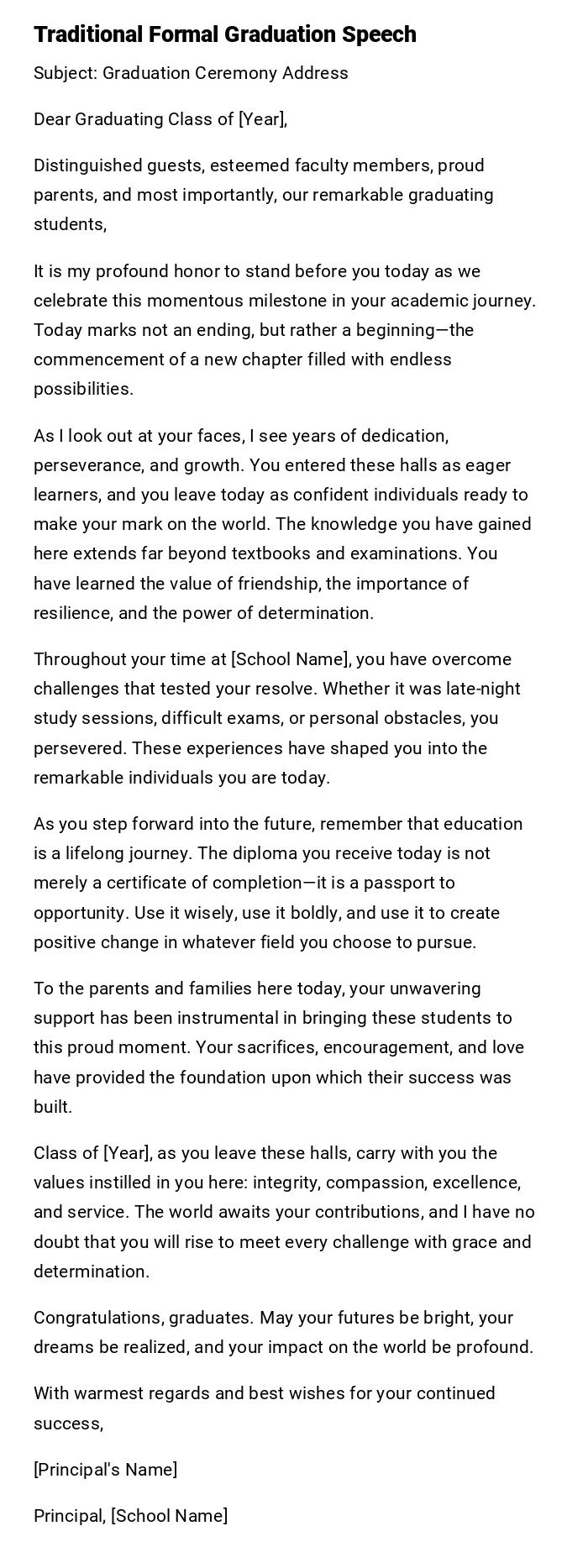
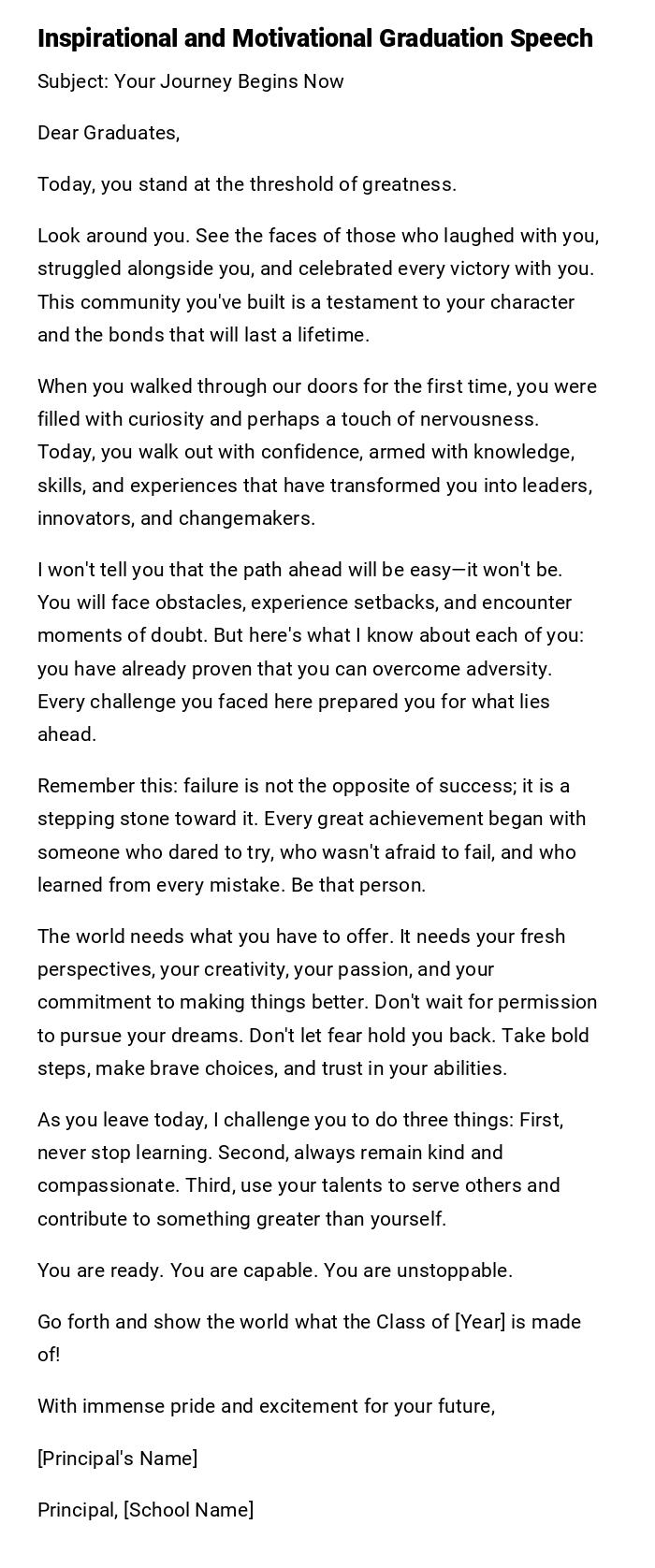
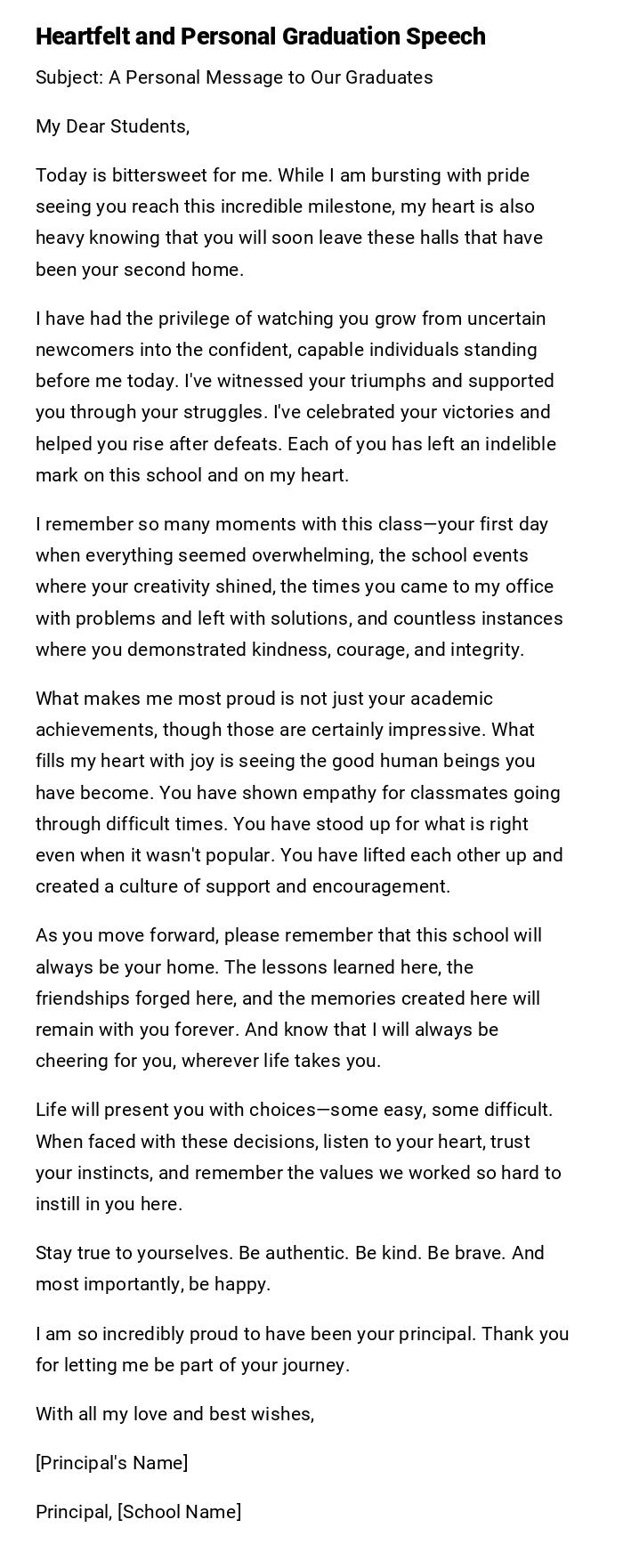
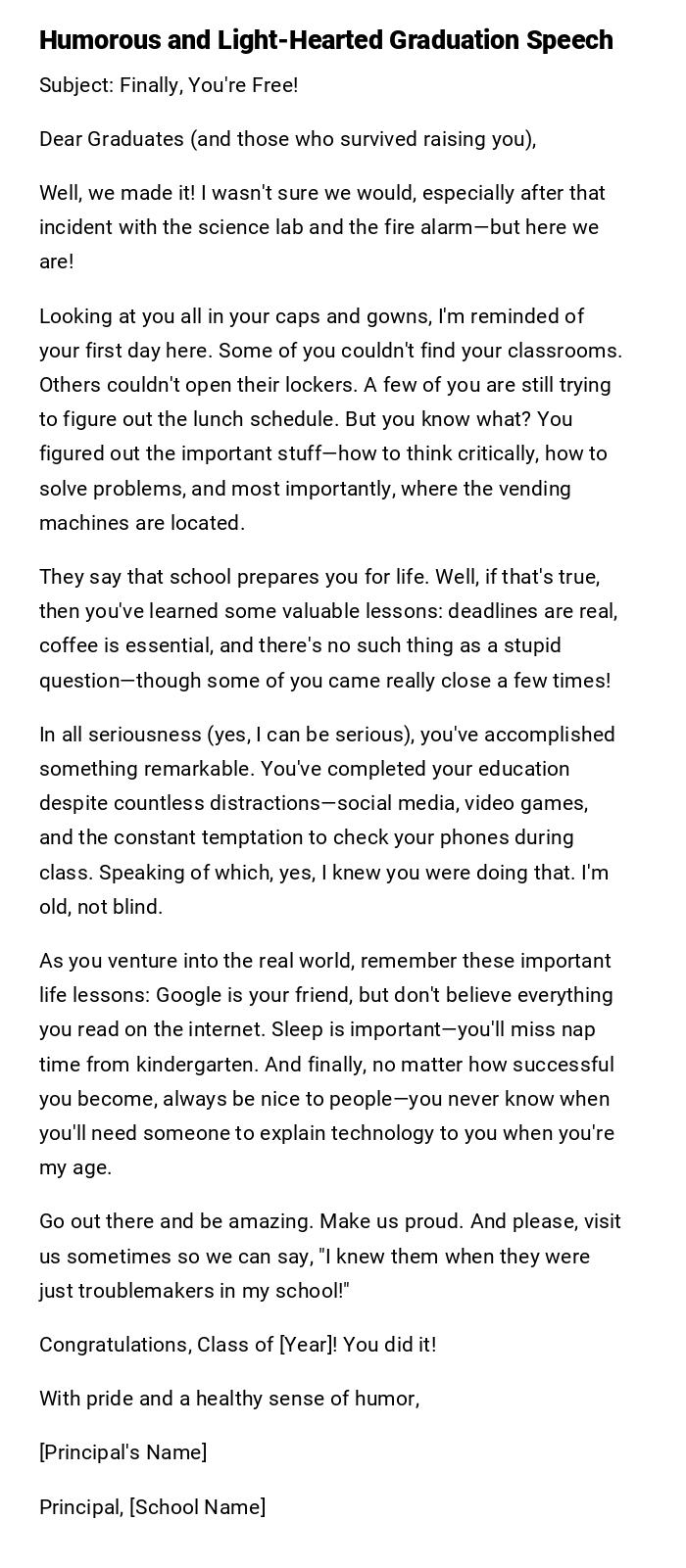
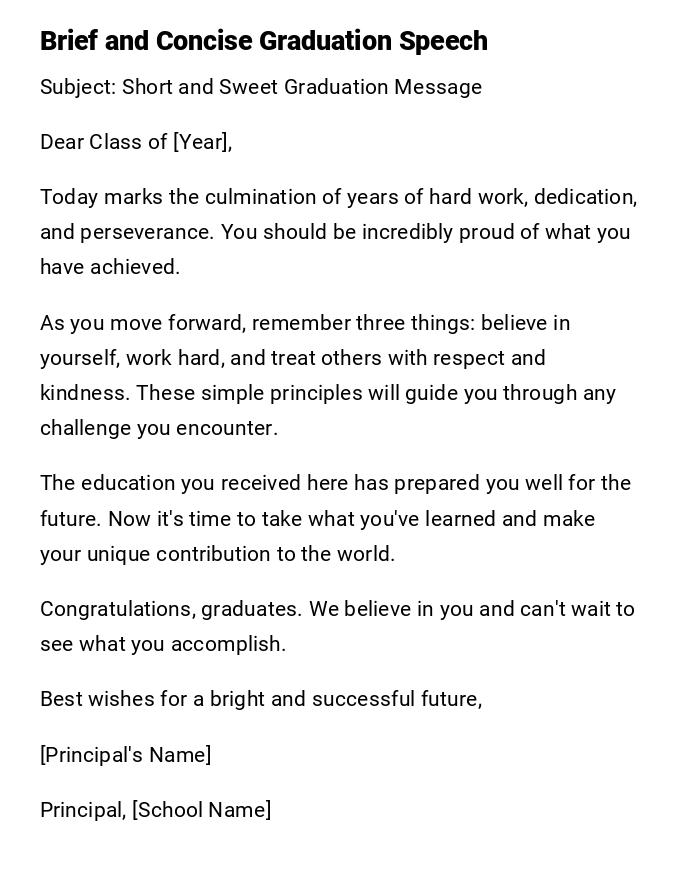
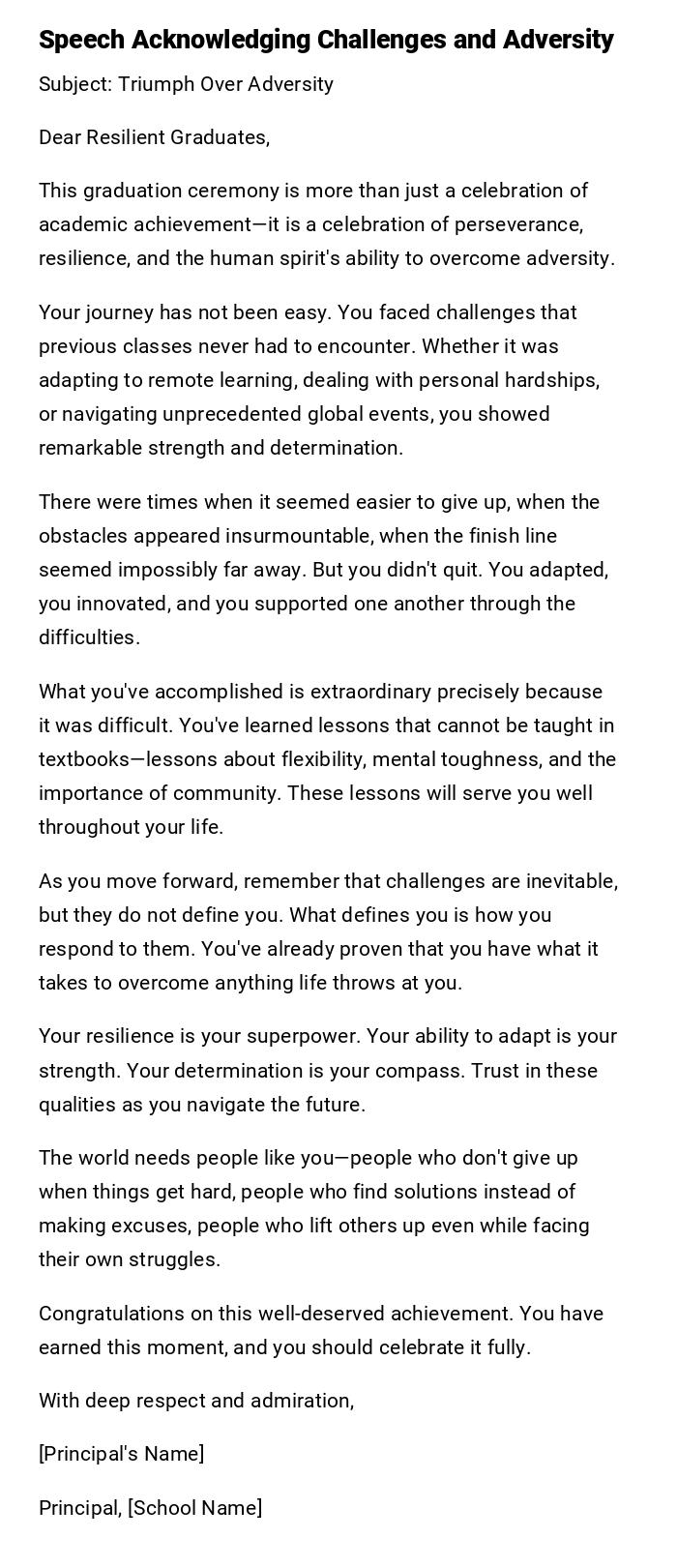
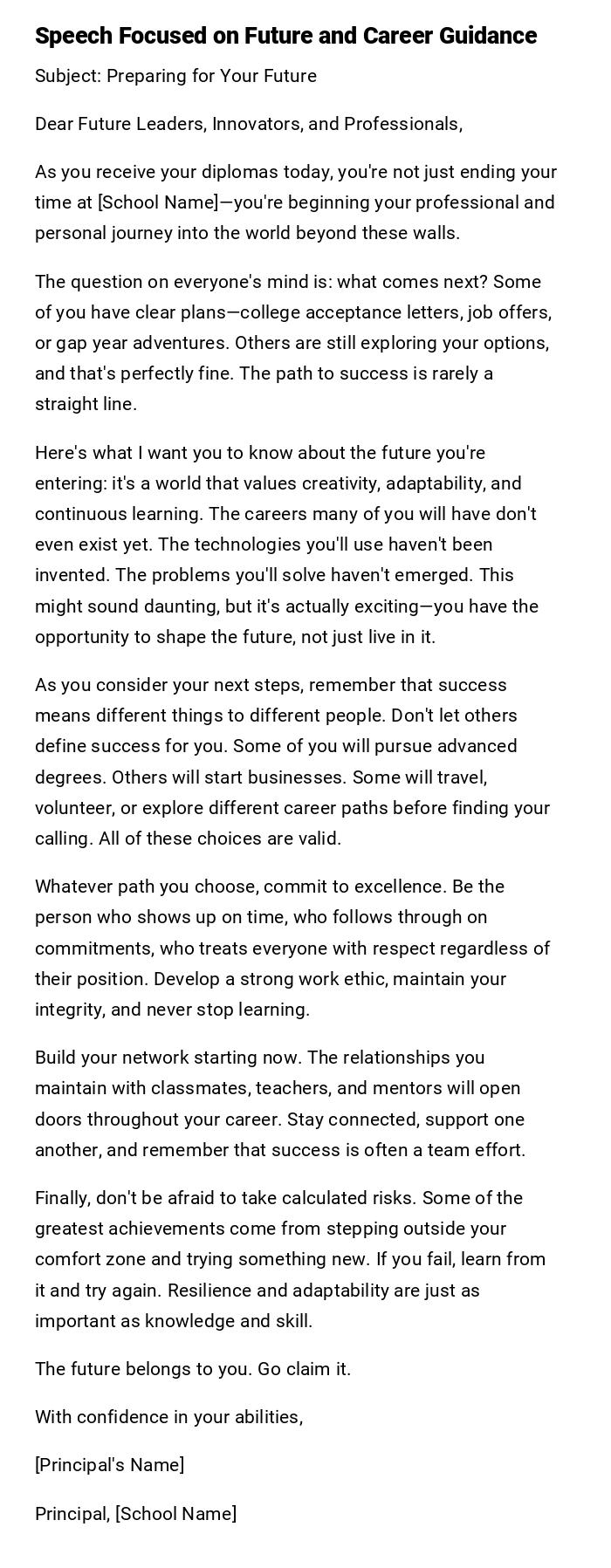
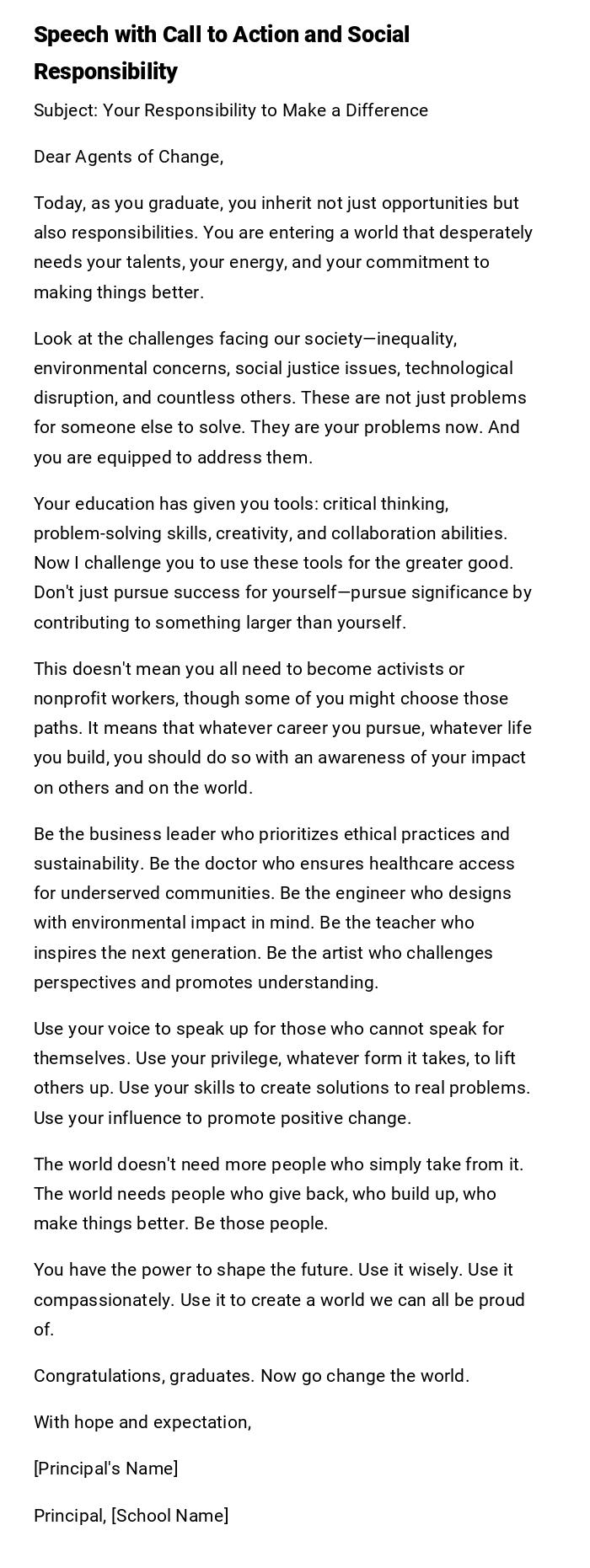

 Download Word Doc
Download Word Doc
 Download PDF
Download PDF